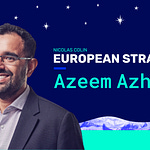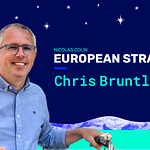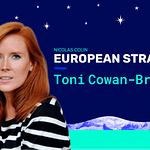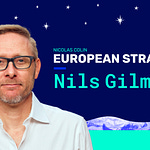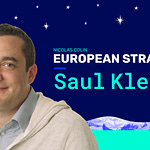The Agenda 👇
Laetitia spoke with author and Financial Times columnist Simon Kuper about what cosmopolitanism means these days 🎧
Thumbs up/down for last week, as well as recent news.
All in all, this week’s a short one 😉
My first memory of Simon Kuper is a column he wrote in November 2013 in The Financial Times about The great middle-class identity crisis. It made a deep impression on me, as we had just started The Family in Paris. The structural shifts impacting the middle class that Simon had written about were the very same I was witnessing working with early-stage startups.
By definition, a paradigm shift is all about a changing representation of the world, and a corollary is that we often lack words to describe what we do and who we are.
Here’s an excerpt from Simon’s foundational column:
That’s been the middle-class experience for ever: people have a professional identity. We are what we do. We choose professions that suit our identity, and then those professions enhance our identity… But that era is ending. With the economic crisis and technological change (robots are taking over the world), ever fewer of us have satisfying jobs or stay in the same profession for life. People are ceasing to be their jobs. That is forcing them to find new identities.
Over the years, I kept quoting this column over and over, including in my book Hedge (about designing a new social contract for the Entrepreneurial Age):
Today the vast majority of people in the West still identify as middle class. But the very concept of the middle class has evolved through time. When I grew up in the 1970s and ’80s, the cardinal value of the middle class was stability. Most people had a fixed place in the world and defined themselves through what they were doing in life.
As for today, being part of the middle class looks more like the main character in Steven Soderbergh’s Magic Mike: laboring during the day as a construction worker, making money as a stripper in night-clubs and private parties, and steadily describing himself as an “entrepreneur”.
As in the case of Magic Mike, gone is the sense of economic security that provided middle class workers with a clear identity. Now we live in a world where job situations are unclear. People are no longer certain about what the future holds or even what their occupation is. Is Magic Mike a construction worker, a stripper, or an entrepreneur? Nobody knows, and so he is forced to decide for himself—in what the Financial Times columnist Simon Kuper calls the “great middle class identity crisis”.
All these years, I had no idea that Simon was in fact so close to my world: he had been living in Paris the whole time; he is married to Pamela Druckerman, whose best-selling book French Children Don't Throw Food (Bringing Up Bébé in the US) was often mentioned in French society (we can only rejoice in a book that makes the case that we French are better at raising children). And we’ve had common friends, such as the historian Patrick Weil.
Then, more recently, my wife Laetitia read Pamela’s latest book There Are No Grown-Ups: A Midlife Coming-of-Age Story, after which she came to me and said “These people are like us in so many ways! We should really try and connect with them.”
Well, now it’s done: Laetitia just interviewed Simon, and I’m set to interview Pamela in just a few weeks. Below is what Laetitia wrote about her conversation with Simon on the Building Bridges website 👇
For this new episode of the Building Bridges podcast, I’m happy to share my interview with Simon Kuper, a British author, Financial Times columnist, and cosmopolitan intellectual whose latest book The Happy Traitor deals with the story of a British spy, George Blake, who defected to the Soviet Union.
Simon lives in Paris but is about to move to Spain with his family for a new experience of cultural immersion. We talked about building bridges across cultures, his multicultural life and identity, multilingualism, mobility… and a few other fascinating subjects (including football).
Many years ago, he moved from London to Paris surreptitiously because he thought his life had become “too comfortable” and he needed a bit of foreignness to make things more challenging. Thus he became a working-from-home pioneer, paving the way for future generations of mobile workers in search of foreign adventures.
Born in Uganda, raised in the Netherlands, educated in the UK, Kuper is convinced there’s no point in learning a language badly and sticking to superficiality. Instead you should go for excellence:
If you do learn a language, go for excellence. If you have children, immerse them in it from birth. Wall Streeters sending their kids to Mandarin-speaking preschools may be hilarious, but they are choosing the most efficient route (…) A multilingual person can be multiple people, inhabiting multiple worlds. As the linguist Nick Evans wrote, “we study other languages because we cannot live enough lives. It’s a multiplier of our lives.”
Incredibly productive during the pandemic, he has worked on multiple books. His latest book The Happy Traitor was published a few months ago. It deals with George Blake, “a one-man Netflix series, whose life tracked many of the dramas of the 20th century”:
When the 98-year-old double agent George Blake died in Moscow on Boxing Day, my biography of him was long since ready. (…) A Briton raised in the Netherlands, he was a teenage courier in the Dutch resistance, joined the British secret services, converted to communism while a prisoner in North Korea and became a spy for the KGB. He then sent dozens of agents working for Britain to their deaths. His crime so shocked Britain that when he was finally unmasked, in 1961, he was given the longest sentence in the country’s modern history — only to escape in a jailbreak so spectacular that Alfred Hitchcock spent his final decade trying to turn it into a film.
👉 Listen to Laetitia’s conversation with Simon Kuper in the latest episode of the Building Bridges podcast using the player above 👆 or on Apple Podcasts or Spotify.
😀 Foreign languages are a topic I wrote about in the past (here and here), always mentioning the terrible thing that is dubbing foreign movies in the local language. Well, there’s room for progress: Can A.I. help Hollywood dub The Rock into another language? This startup thinks so.
🙂 I was pleased to be intermittently involved over the past years in the project A New Moral Political Economy led by Margaret Levi and Federic Carugati at Stanford University’s CASBS. The whole effort has now turned into a book, a free version of which is available until June 8 on the Cambridge University website (via Tim O’Reilly): A Moral Political Economy: Present, Past, and Future.
😏 In 2019 my colleagues and I hosted new media analyst (and CIA alumnus) Martin Gurri in Paris and London to discuss his book The Revolt of the Public. We’re now 7 years after the first edition of the book, and Martin just wrote a short sequel: The Establishment Strikes Back—For Now.
😐 The cloud is a good thing because it makes computing cheaper for businesses, right? Not so fast, write Sarah Wang & Martin Casado of Andreessen Horowitz in The Cost of Cloud, a Trillion Dollar Paradox. It explains why large companies such as Dropbox have moved away from AWS.
😒 More Dominic Cummings! Long gone are the days when he was tackling the challenge of reshaping the British state. Now that that state has utterly failed countering COVID-19, Cummings tried to explain to Parliament why: read details here and Ian Leslie’s commentary here.
😖 Is it 2020 all over again? Now that many think the pandemic is over, people in the West have stopped taking precautions, even though they’re not vaccinated. It might lead to a new wave of infections, this time affecting primarily young people: Covid-19: UK in early stages of third wave - scientist.
🦊🦁 My colleagues’ posts in The Family’s daily newsletter this week: The courage in choosing (by my colleague Alice Zagury) & What's changed in entrepreneurship? (by my colleague Oussama Ammar).
🇫🇷 Nouveau Départ (our small French-speaking media operation): give last week’s edition about Royaume-Uni : le parti travailliste est-il fini ? a listen; also check out Laetitia interviewing Judith Aquien about La grossesse : nouvelle frontière du féminisme.
From What Language Should Startups Speak? (November 2019):
I’ve long been obsessed with foreign languages. I grew up speaking only French, then had hours of useless language classes in high school. Later, I got rather serious with learning German. And now I obviously can speak and write in English, but I often have to pause to reflect on how best to convey my thoughts; I make the occasional mistake (which my colleague Kyle is kind enough to correct when it’s in written form); and I’ll never be able to speak with a perfect accent, which is a shame (and a bit of a mystery—why are accents so difficult to erase?).
Maybe I could have done better. It’s true that I never lived outside France until the age of 21, and my family never travelled much. Yet several relatives have always lived abroad. And as I grew up, my grandfather Xavier, a devout Catholic, was dutifully learning Italian from his home in Normandy so as to be able to read L'Osservatore Romano and to listen to Radio Vaticana! So I didn’t lack role models—people close to me who were mastering foreign languages.
Sign up to European Straits if you don’t want to miss the next issues 🤗
(Credit: Franz Liszt, Angelus ! Prière Aux Anges Gardiens—extrait du disque Miroirs de Jonas Vitaud, NoMadMusic.)
From Munich, Germany 🇩🇪
Nicolas












